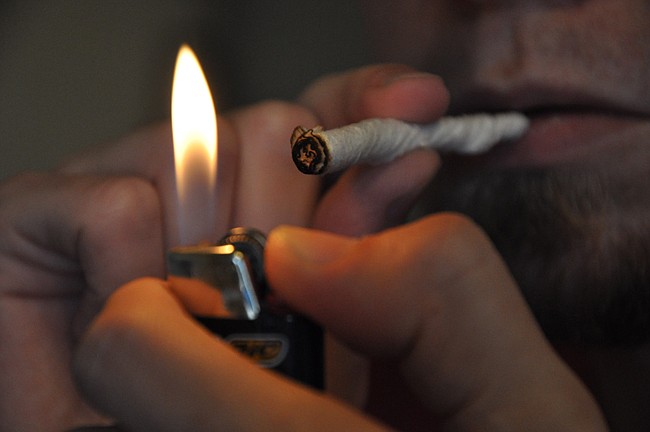- April 25, 2024
-
-
Loading

Loading

How do local lawmakers feel about marijuana being on the ballot in November? There’s still plenty of fear of “Reefer Madness” scenarios if the law passes.
The Florida Supreme Court’s approval on Jan. 27 of a medical marijuana initiative on the general election ballot officially puts legalization in the hands of Florida residents in the November election.
The Sunshine State could join 20 other states that have already legalized medical marijuana if passed, but the potential for legalization raises questions among local law enforcement and government officials in Central Florida.
“As a healthcare provider and as a mayor, I would never want to stand in the way of medicine from getting to people that would have a benefit,” Winter Park Mayor Ken Bradley said. “If you peel this onion back in multiple ways and you look at the ordinance from afar that I’ve seen in Colorado and Washington state, you have to ask yourself ‘Is this being used for medicinal purposes or not?’”
“That to me is a very important distinction.”
But Bradley’s greatest concern revolved around whether drivers would be impaired by marijuana, opening the door for more car accidents throughout the state.
The hot topic of marijuana legalization comes before the U.S. with interesting timing, Bradley said.
“I listened to Jay Leno’s last show and he said he never thought that 22 years later he would see tobacco being incredibly outlawed and marijuana being brought in,” Bradley said.
“You really can’t smoke anywhere, but you can smoke marijuana freely.”
Pro-legalization activists point to the economic benefits reaped by states like Colorado and Washington State since legalizing marijuana. Colorado pulled more than $5 million in tax revenue during their fiscal year of 2011-2012 from medical marijuana sales.
But Winter Park Commissioner Steven Leary remained skeptical of that theory justifying legalization.
“I think there’s other ways to raise revenue without putting in place something that could possibly be detrimental to people’s health and could be a gateway drug to youths,” Leary said.
“I think unfortunately it’s probably being used as a pawn in the effort to get certain groups to come out and vote. I think some of the work behind this effort is disingenuous.”
Other local cities such as Maitland and Oviedo are already preparing for a potential legalization.
Maitland City Attorney Cliff Shepard proposed that the city look into drafting municipal regulations for potential medical marijuana sales before the legalization initiative goes up for citizen vote in November. Other Florida cities, such as Cocoa Beach, are already crafting ordinances relegating where medical marijuana dispensaries could set up shop to get ahead.
Shepard said in other states where medical marijuana has been legalized, the cities with preexisting regulations were able to keep their statutes in place once federal mandates took hold. So, he said, if Maitland wants to have its own control of where dispensaries could pop up – instead of folding to federal rules – it needs to get working on an ordinance before November.
“I want to make sure we don’t get behind the curve,” he said.
The Maitland City Council set plans to discuss the drafting of a potential ordinance an upcoming Council meeting.
Oviedo Mayor Dominic Persampiere, City Manager Bryan Cobb and Police Chief Jeffrey Chudnow have already started discussions on how their city can get a leg up on issues that may come out medical marijuana.
“Some feel that medical marijuana for medical uses has a good purpose, and it probably does,” Persampiere said. “What concerns me – and it’s probably what would concern most in law enforcement or elected officials – are those who will try to skirt around the system and use it recreationally.”
“We’ll just have to wait and see.”
Florida’s previous history of pain medication left Persampiere cautious of marijuana legalization. Rampant drug addiction emerged throughout the state in 2010 due to hundreds of pain clinics excessively selling medication and writing illegal prescriptions.
The year-long crackdown that followed in 2011 resulted in police removing nearly half a million pills off the streets and making 2,150 arrests, including 34 doctors, according to the Florida Department of Law Enforcement website.
“I just certainly hope that this doesn’t turn into another round of the pill mills that we all dealt with involving the oxycodone,” Persampiere said. “Those are the types of things that law enforcement will have to prep themselves for.”
The concept of legalization alarmed Winter Springs Police Chief Kevin Brunelle from a law enforcement perspective. Marijuana’s potential of leading to harder drugs could eventually increase drug crimes, Brunelle said.
“Can I attribute all of that because of marijuana? No,” Brunelle said. “But you could attribute the fact that most burglaries aren’t people trying to get money to feed their families, they’re trying to feed their addictions.”
The ballot item’s language itself raises other questions. Medical marijuana can only be used to treat “debilitating” illnesses, which creates a gray area for what fits that description, Brunelle said.
“I understand our politicians who get up there and say things like ‘It’s only going to be used for medical purposes. You can only get it with a prescription,’” Brunelle said. “Let’s be honest. Do you think 75 percent of the people in Colorado and Seattle who get that medical certificate have a ‘debilitating’ disease?”
“What is a ‘debilitating’ disease?”
Residents in Colorado and Washington State no longer needed a medical certificate to obtain marijuana after Jan.1, as per an amendment allowing recreational use passed by voters in the 2012 general election.